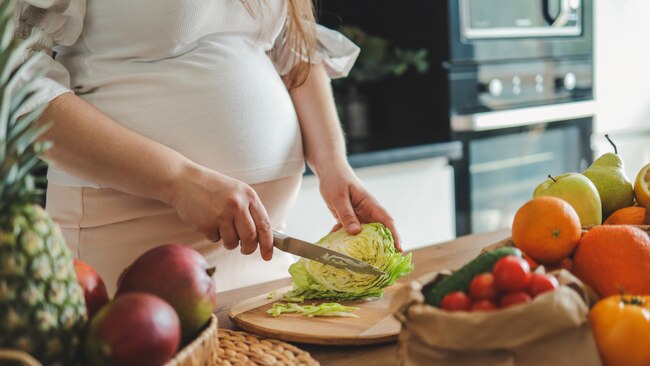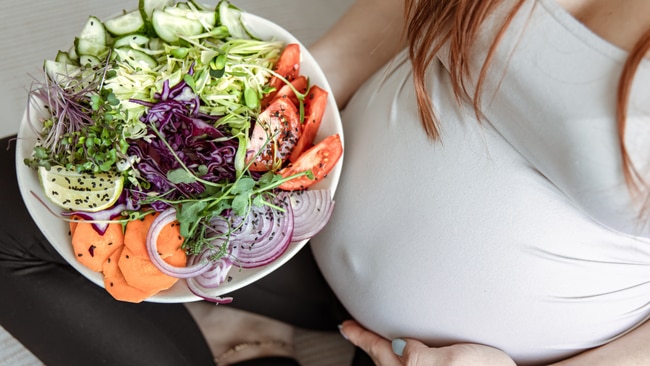Pregnant women should go plant-based, new study says
The latest recommendation

Lifestyle
Don't miss out on the headlines from Lifestyle. Followed categories will be added to My News.
A new study examining the impact of a primarily plant-based diet during pregnancy has left some experts eagerly recommending the nutrition plan. So, what benefits does plant-based provide for mother and baby?
Whether you’ve experienced pregnancy yourself, been alongside a partner who has, or simply enjoy following along with each Kardashian baby (I’ve lost count at this point), there’s no denying the significant lifestyle changes that come with falling pregnant.
While most are guided by well-intentioned health advice, such as avoiding alcohol, others can feel like little more than ill-researched opinions. With so much conflicting information about what to do, and what not to do during pregnancy, discerning fact from fiction is anything but easy, especially when it comes to supporting yourself and your growing baby through nutritional means.
Now, the latest recommendation suggests a complete diet overhaul for women of childbearing age. The results from a recent study published in the American Journal of Obstetrics and Gynecology, demonstrate the effectiveness of a plant-based diet in minimising the risk of developing hypertensive disorders during pregnancy.
Like what you see? Sign up to our bodyandsoul.com.au newsletter for more stories like this.
Details of the study
The researchers followed nearly 11,500 women older than 18, throughout the entirety of their reproductive years. Upon embarking on the study, the participants’ diets were evaluated using a validated food questionnaire about the frequency and quality of plant-based foods they consumed. This questionnaire was reassessed every four years to ensure accuracy as the participants’ lifestyles evolved.
"We wanted to know how one's diet leading up to pregnancy influences the pregnancy, so we monitored women for virtually their entire reproductive life, almost 20 years, and gained an awareness of their typical diet before pregnancy," writes study author Dr Jorge E. Chavarro.
Using the results of the questionnaires, each participant was assigned a plant-based diet index (PDI), regardless of their proclivity to a plant-based or omnivorous diet. The women who best adhered to a plant-based diet were designated a higher score.

The results support a plant-based diet
At the conclusion of the study, researchers found a consistent correlation between the proportion of animal products and the prevalence of hypertensive instances. As the amount of animal products decreased (subsequently increasing plant-based alternatives), the risk of women experiencing hypertensive disorders of pregnancy notably decreased.
Ranging from mild to severe, different degrees of hypertension (abnormally high blood pressure) during pregnancy carry immense risk to both mother and child. Gestational and chronic hypertension can be the leading cause of low birth weight and premature delivery, and in the most severe cases, pregnant women are at risk of developing preeclampsia, a life-threatening condition.
Women with the highest PDI rating were reported to have had a 24 per cent lower risk of hypertensive disorders of pregnancy than those with significantly lower PDI ratings.

"It was clearer for pregnancy-related hypertension than for preeclampsia, but a diet made up primarily of plant-based foods seemed to be protective for both," says Chavarro.
In addition to the immediate risks such conditions cause during pregnancy, other chronic illnesses later in life have also been linked to hypertensive disorders. As the results of this study prove, subscribing to a plant-based diet long before and after pregnancy may be our best defence against chronic illness.
"Could it be that modifiable lifestyle factors before and during pregnancy may not only help reduce problems during gestation but also prevent women's health problems years later? That was the general motivation for this study," Chavarro says.
The benefits go beyond a healthy pregnancy
Already revered for its cardiovascular health benefits in non-pregnant adults, the latest study is yet another positive reference to the power of the plant-based diet
Despite focussing on minimising the risk of hypertensive disorders during pregnancy, the study examined women for the entirety of their reproductive years. Taking into consideration all data, researchers concluded a plant-based diet is most beneficial when adopted before, and after, the typical pregnancy period.
While further research is needed, the study supports the notion that improved weight control (from subscribing to a plant-based diet) is largely responsible for the impressive results.
As always, consult with your GP or prenatal specialist before embarking on any major dietary change.
More Coverage
Originally published as Pregnant women should go plant-based, new study says




